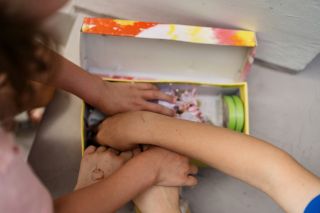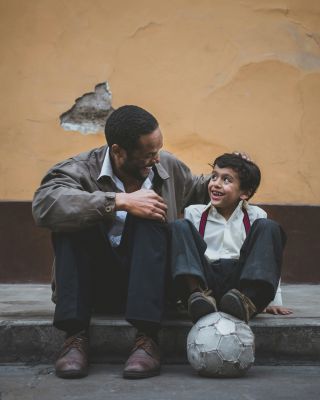With the holiday season just around the corner, families and households will soon be gathering to give and receive gifts. Many will also be sending donations to communities in crisis and organizing charity events and food drives to help others.
The reason for our holiday generosity is obvious to us as adults. We hold a sense of moral responsibility to be kind and get the satisfying feeling of having done a good deed.
For children, it can sometimes be less clear why, when, and how they should show kindness to others.
Based on my research and that of other developmental psychology researchers, here are three things science says parents can do to encourage generosity this holiday season.

Model kindness
Children learn best by seeing and imitating. Observing adults and the consequences of their actions teaches children which behaviors are good or bad, kind or mean.
As a parenting and child psychology researcher, I have worked with colleagues to understand how parents can model kindness and generosity to successfully teach their children these same values. Our research suggests that parents who practice kind and warm interactions with their children tend to have kind and generous kids.
For example, speaking with your child about emotional experiences you each had during the day can help your child learn how to help others feel better when they’re distressed.
Naturally, modeling kindness is also most effective when you hold kindness and generosity as deeply cherished values. In our research, we have found that kids donate more money to a charity when mothers deeply hold these values.

As we head into the holidays, continue to demonstrate empathy and kindness to your children, modeling for them that being kind can show someone in crisis that you care.
With the ongoing wars and disasters across the world, kids might get distressed when hearing about other children in crisis. In these cases, help your kids feel better by talking about their feelings and comforting them and offer suggestions on what you can do as a family to help those in need.
You can also consider taking your kids with you to volunteer at a local shelter or organizing a toy drive with the whole family to model charity and generosity.
Avoid rewarding generosity
It’s natural to want to reward children when they are generous to others. You probably feel proud of your kids when they share or donate, and you might want to show them that you are happy with how they behave.
However, developmental psychologists have shown that some rewards can thwart children’s future desire to be kind. Kids simply don’t offer to help others as much when they are given material rewards—like gifts, treats, or money—compared to being praised or receiving no feedback at all.
Instead of rewarding your child for donating part of their allowance, consider rewarding them with your words by praising them. Even a smile can go a long way—and they might even produce a bigger donation next year.

Praise who they are, not what they do
Over 60 percent of parents report praising their kids for being kind to others. But certain types of praise are better than others for encouraging kindness.
Praising a child for being a kind person is more effective than praising their kind behavior. Kids who are praised for being kind or helpful people have been shown to volunteer more time to help others compared to kids praised for working hard to help others. This kind of “person praise” can be effective for guiding your child to self-identify as a person who always helps others.
To encourage your kids’ generosity this holiday season, praise their charitable actions by telling them they are a kind person or that they are the type of kid who really understands how other people feel.
As we approach the holidays, research suggests using modeling and giving praise to encourage kids to be generous and kind. If you’re participating in a holiday food drive for refugees, have your kids tag along and help sort foods. When your kids want to make a donation, praise them for being kind individuals.
These small steps can help your child build empathy for others and show kindness to those in need and might even make them more generous the next holiday season.
After all, what would the holidays be without sharing?
This article is also published in The Conversation Canada.
